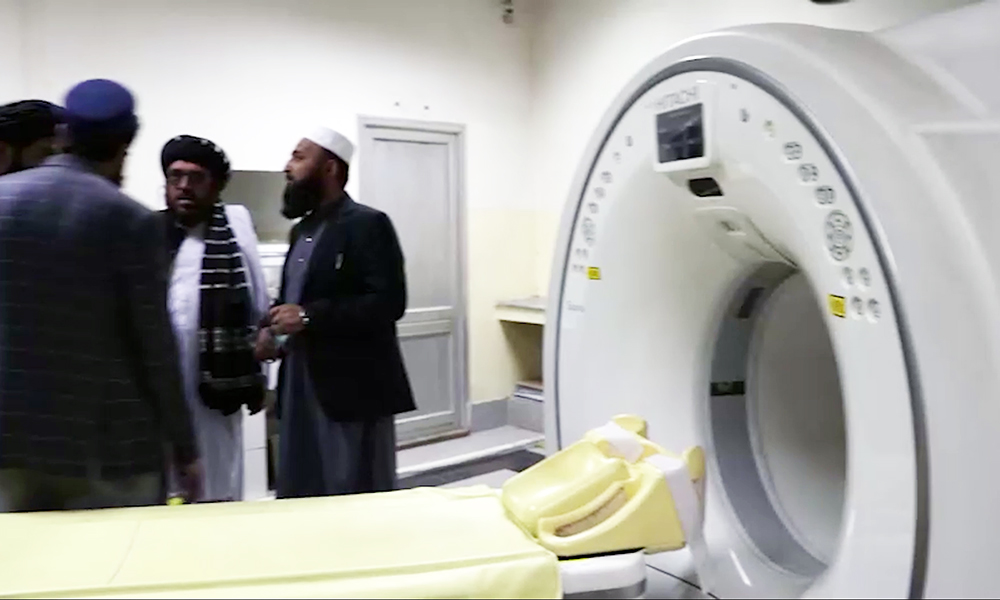Health
New shipment of WHO life-saving medical supplies lands in Kabul

An aircraft carrying around 7 metric tonnes of life-saving medicines and supplies from the World Health Organization landed in Kabul last week, the organization confirmed Monday.
According to a statement issued by the organization, the shipment was delivered in collaboration with the operations and logistic teams of Qatar Airways and the government of Qatar.
This is the fourth flight carrying WHO supplies to arrive in Afghanistan from Doha since 30 August 2021.
The supplies include medicines for the treatment of 5,000 children suffering from severe acute malnutrition, diarrhoea, pneumonia, upper respiratory infections, and other conditions.
“Health needs in Afghanistan are greater than ever before, and we are moving quickly to address shortages in medical supplies to keep life-saving health services running. Children are the tragic victims of the country’s failing health system,” said Dr Ahmed Al-Mandhari, WHO Regional Director for the Eastern Mediterranean.
He also expressed the organization’s gratitude to Qatar for their help in delivering the supplies.
“This show of ongoing solidarity is a concrete demonstration of our regional vision in action: health for all people, with the support all people,” said Al-Mandhari.
Since 30 August, 4 flights from Qatar to Afghanistan have delivered a total of 60 metric tonnes of WHO supplies, which are enough to cover the urgent health needs of almost 1.5 million people.
Health
Azerbaijan urged to help improve capacity of Afghan health workers

Acting Minister of Public Health Qalandar Ebad, in a meeting with Azerbaijan’s ambassador, Ilham Mohammadov, called for the country’s assistance in improving the capacity of Afghanistan’s health workers.
The two sides also discussed cooperation in the health sector, capacity building of Afghan health workers, and Azerbaijan’s role in the health sector and other issues, according to a statement released by the Public Health Ministry.
Azerbaijan’s envoy said that his country seeks to cooperate with Afghanistan in a sustainable manner in the field of health.
In other news, the foundation stone for the construction of oxygen production facility was laid at the Indira Gandhi children hospital in Kabul.
Officials of the Ministry of Public Health said that the facility will be built with the financial and technical assistance of the World Health Organization, and with the capacity to produce 200 cylinders of oxygen daily to meet not only the needs of the hospital, but also other health facilities.
Health
Balkh health officials report sharp increase in number of cancer patients

Balkh Public Health Department officials say there has been a significant increase in the number of patients with cancer in the province.
“In 1401, about 2,613 OPD (out patient department) cases were registered with us. In 1402, these figures were 4,912 cases,” said Ehsanullah Kaliwal, the head of the oncology department at Balkh Regional Hospital.
Some doctors say genetic factors, environmental pollution, arbitrary use of medicines, and excessive consumption of meat were reasons for the sharp increase.
One doctor said cancer was also hereditry.
However, a large percentage of cancer patients in Balkh have stomach cancer. Many of them have appealed for the government to improve treatment facilities.
According to health officials, in the first month of this solar year (April), 423 cancer patients visited this hospital for treatment.
Health
Majority of Afghans with mental disorders are women: officials

Based on last year’s data, 52 percent of people with mental disorders in Afghanistan are women, the Ministry of Public Health said.
However, after the Islamic Emirate took over the country and with the improvement of nationwide security and the provision of better health services, mental disorders have decreased, the ministry said.
“Overall, the mental security of men and women in Afghanistan is not ensured and their mental security is disturbed. According to the figures shared with us, in 2023, 52 percent of the visitors for mental disorders were women,” said Sharaft Zaman Amarkhil, the spokesperson of the Ministry of Public Health.
“Generally speaking, we can say that compared to the past, the instances of mental illnesses have decreased,” he added.
People suffering mental disorders mostly refuse to share their problem, willingly or unwillingly.
“There are many problems at home; We are poor. I finished school, but didn’t find any job,” Ansar, a mentally ill person, said.
According to the World Health Organization (WHO), half of Afghanistan’s population suffers from mental distress.
Factors such as unemployment, poverty, domestic violence, ban on girls’ and women’s education and work, and drugs are said to be key contributors to mental distress.
-

 Latest News5 days ago
Latest News5 days agoPakistan’s frontiers minister stresses ‘dignified’ return of Afghan refugees
-

 Latest News3 days ago
Latest News3 days agoRashid Khan named AWCC’s brand ambassador
-

 Regional3 days ago
Regional3 days agoIranian president lands in Pakistan for three-day visit to mend ties
-

 Climate Change4 days ago
Climate Change4 days agoMassive river flooding expected in China, threatening millions
-

 Latest News5 days ago
Latest News5 days agoChinese keen to invest in Panjshir-Kabul water conduit project
-

 World5 days ago
World5 days agoTwo Japan navy helicopters crash, one body found, 7 missing
-

 Sport3 days ago
Sport3 days agoKolkata beat Bengaluru by one run in IPL as Kohli fumes at dismissal
-

 Sport4 days ago
Sport4 days agoACL: Aino Mina 3-0 Istiqlal Kabul; Attack Energy 3-0 Khadim
























